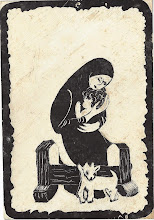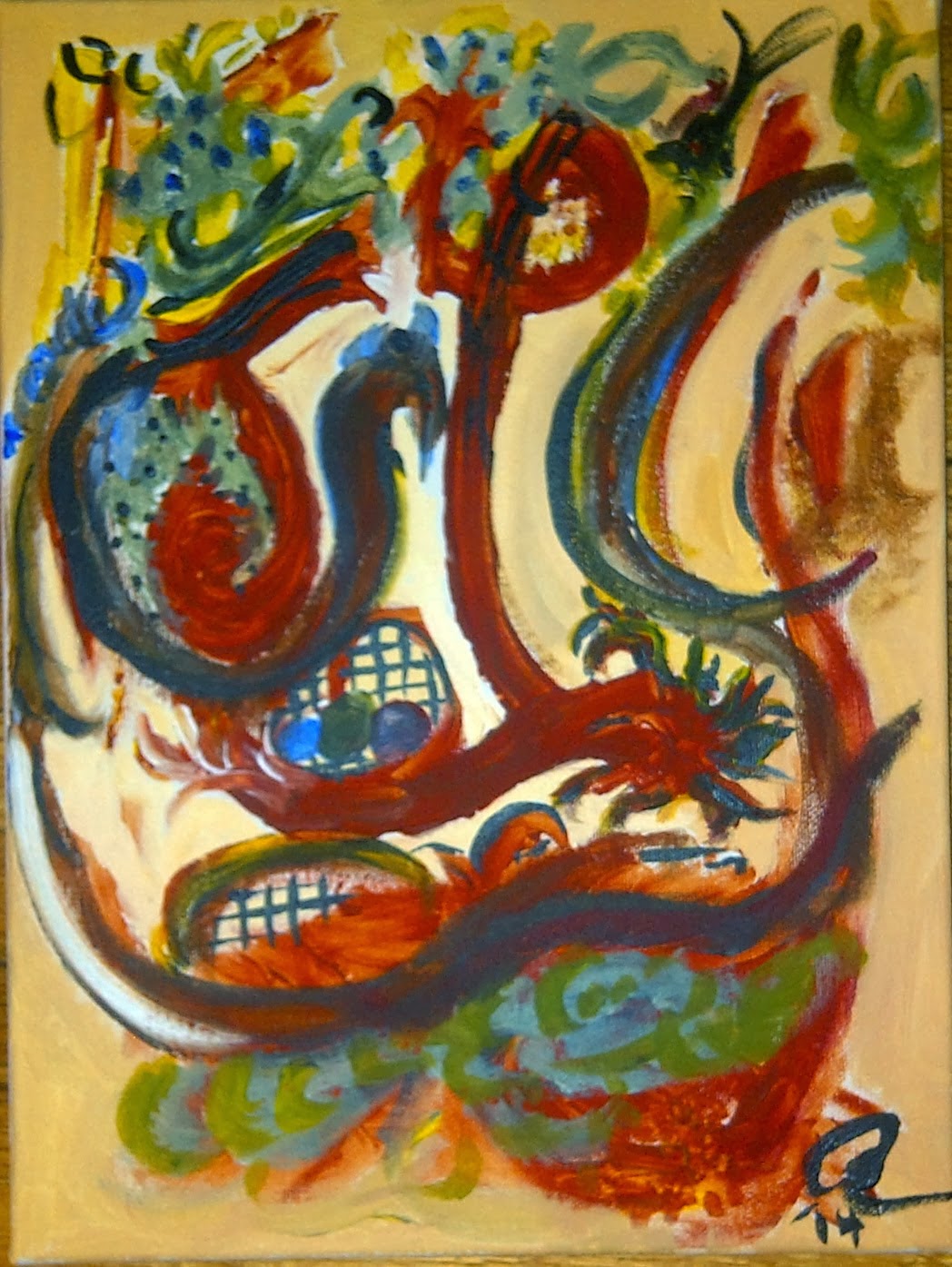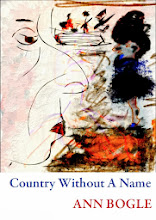New at Big Bridge 14, ed. Vernon Frazer and Michael Rothenberg:
"The Housecoat" (1987)
"Mugabe Western" (1985)
excerpts from Work on What Has Been Spoiled (1988-1993)
Sunday, August 23, 2009
Wednesday, August 19, 2009
Turning Thirty
Of all the authors in the library, it was a wife from Maryland who called out from her marriage dormer I was not to read her. It might have been 2005. She shouted: “Some people should not be allowed to read books!” I intuited from Minnesota that the shout was for me, though we hadn’t spoken of or to each other since graduate school, nor even then.
On the cover of her book is a girl from the waist down in black skirt and shoes. It is one of many covers that began to appear after Reading Lolita in Tehran had delivered Lolita in a turn in planetary events as a beloved American novel to the hands of school kids and friends of Bill W.
I have a writer friend in her sixties who reads for language, for its sounds and expression. She does not read to be taught moral lessons. She reads to listen to language as if it were as abstract and lyrical as music, emotive and without argument.
I have another friend, nearing 60, who reads like a music librarian. He reads Vladimir Nabokov. He reads Robert Musil. He reads Alice Munro. He’s read more of Richard Howard’s translations than anyone I’ve met (Richard Howard, who knows the wife in Maryland and her poetry but not my reader friend). He reads scores. On the train he may read scores or he may conform and read The New Yorker. He might argue that music does argue, that he follows its arguments as if they were written in Italian rather than in notes on a page.
I used to read then write for the enjoyment of language -- Gertrude Stein through the Beats -- and when I read Lolita it was that way. I said later that Lolita was top shelf, not a book for messengers, but that might have been off, a dusty statement.
Then the covers appeared: girl from the waist down in rain boots. Girl from the waist down in Mary Janes. Girl from the waist down her socks slipping. Girl from the waist down on a park bench in the sun. These covers spoke as clearly as the bones and ghosts in titles.
After the Maryland wife telekinetically commanded me not to read, reminding me for the first time of child prostitution in her father’s native country, I turned away and didn’t read her book. A princess, she gave in an interview that she drank whiskey in a Manhattan studio before she married. There are different kinds of whiskey. Being there, reading. I didn’t know what game she’d won. I didn’t know how, whether with her glistening branch of hair; her pretty knees (knees I don’t recall); or her visionary decision to write with her writer husband their first sex in Nerve.
In John 4:18, the harlot is a Samaritan who has had five husbands, and the man she has now is not her husband. The husbands of the departed wives have strokes and sinus infections and seizures and lesions and kneecap replacements. They are celibate, though they may own someone.
I began not to care as I had cared that women I had known were at last publishing novels, except for the first one at 30 whose books I’d read, women trained to write poetry who had been cheerleaders in high school, multicultural cheerleaders who had married, had children, and in middle age signed novels about women turning thirty. I saw how parochial and sycophantic it might seem to care for novels written by women in friendships tested by beauty: Asian white cheerleaders! Latina white cheerleaders!
I had been a cheerleader at Lolita’s age or younger. In fourth grade in our red corduroy skirts and white wool turtlenecks we looked like the girls on the book jackets. It was a year of red, white, and blue bell bottoms, chokers, and mini-skirts. It was not a decade of pink stretch pants, pink sweatshirts, and pink snowsuits.
The police heard the music at my birthday party in fifth grade: a group of us girls had taken the portable record player to the park in the middle of the night and dropped our clothes. We hid in the willows from the cops’ search light, our outfits draped over the hockey boards. The light scanned the horse path in a staccato blare then passed. We were aware but not afraid. I had felt in my spirit a song, though not a song, about “freedom,” a poem that had nothing to do with law, religion, or sex. The girls who stayed curled in sleeping bags while the others streaked in the night became athletes and cheerleaders, sisters without borders of the doctors of “turning thirty.”
I had thought of reading every book by every writer I had met. When the wife in Maryland shouted across the country, I had read the novels of a classmate, for joy that she had come so far, for joy in the stories and surprises in language, for joy that she had beat the clock and found readers, not only the competitive and pilfering and preening writers who’d been her audience at school, but readers for a story.
The institutional preference for short poetry and novels rushes one at the AWP in the form of human bodies, younger women and older men, poets seeming to outnumber fiction writers eight to one with their sixty- to eighty-page collections surpassing fiction writers’ cumulative stacks of “nothing.”
The wife in Maryland had not studied fiction writing, had not sat in fiction workshop, and her novels with the girl from the waist down and the rainboots on the covers became New York Times bestsellers.
In 1997, nearing 35, I sent a short story about turning 28 to an editor at The New Yorker. The editor, a poet herself, called the story “ambitious.” It took eleven years, but Vernon Frazer published it as “The Sitzer” in Big Bridge. Meanwhile, an essay by Ben Marcus on experimental fiction appeared in Harper’s in 2005. Marcus writes, “ambitious” in menial code suggests “You stand not with the people but in a quiet dark hole, shouting to no one.”
On the cover of her book is a girl from the waist down in black skirt and shoes. It is one of many covers that began to appear after Reading Lolita in Tehran had delivered Lolita in a turn in planetary events as a beloved American novel to the hands of school kids and friends of Bill W.
I have a writer friend in her sixties who reads for language, for its sounds and expression. She does not read to be taught moral lessons. She reads to listen to language as if it were as abstract and lyrical as music, emotive and without argument.
I have another friend, nearing 60, who reads like a music librarian. He reads Vladimir Nabokov. He reads Robert Musil. He reads Alice Munro. He’s read more of Richard Howard’s translations than anyone I’ve met (Richard Howard, who knows the wife in Maryland and her poetry but not my reader friend). He reads scores. On the train he may read scores or he may conform and read The New Yorker. He might argue that music does argue, that he follows its arguments as if they were written in Italian rather than in notes on a page.
I used to read then write for the enjoyment of language -- Gertrude Stein through the Beats -- and when I read Lolita it was that way. I said later that Lolita was top shelf, not a book for messengers, but that might have been off, a dusty statement.
Then the covers appeared: girl from the waist down in rain boots. Girl from the waist down in Mary Janes. Girl from the waist down her socks slipping. Girl from the waist down on a park bench in the sun. These covers spoke as clearly as the bones and ghosts in titles.
After the Maryland wife telekinetically commanded me not to read, reminding me for the first time of child prostitution in her father’s native country, I turned away and didn’t read her book. A princess, she gave in an interview that she drank whiskey in a Manhattan studio before she married. There are different kinds of whiskey. Being there, reading. I didn’t know what game she’d won. I didn’t know how, whether with her glistening branch of hair; her pretty knees (knees I don’t recall); or her visionary decision to write with her writer husband their first sex in Nerve.
In John 4:18, the harlot is a Samaritan who has had five husbands, and the man she has now is not her husband. The husbands of the departed wives have strokes and sinus infections and seizures and lesions and kneecap replacements. They are celibate, though they may own someone.
I began not to care as I had cared that women I had known were at last publishing novels, except for the first one at 30 whose books I’d read, women trained to write poetry who had been cheerleaders in high school, multicultural cheerleaders who had married, had children, and in middle age signed novels about women turning thirty. I saw how parochial and sycophantic it might seem to care for novels written by women in friendships tested by beauty: Asian white cheerleaders! Latina white cheerleaders!
I had been a cheerleader at Lolita’s age or younger. In fourth grade in our red corduroy skirts and white wool turtlenecks we looked like the girls on the book jackets. It was a year of red, white, and blue bell bottoms, chokers, and mini-skirts. It was not a decade of pink stretch pants, pink sweatshirts, and pink snowsuits.
The police heard the music at my birthday party in fifth grade: a group of us girls had taken the portable record player to the park in the middle of the night and dropped our clothes. We hid in the willows from the cops’ search light, our outfits draped over the hockey boards. The light scanned the horse path in a staccato blare then passed. We were aware but not afraid. I had felt in my spirit a song, though not a song, about “freedom,” a poem that had nothing to do with law, religion, or sex. The girls who stayed curled in sleeping bags while the others streaked in the night became athletes and cheerleaders, sisters without borders of the doctors of “turning thirty.”
I had thought of reading every book by every writer I had met. When the wife in Maryland shouted across the country, I had read the novels of a classmate, for joy that she had come so far, for joy in the stories and surprises in language, for joy that she had beat the clock and found readers, not only the competitive and pilfering and preening writers who’d been her audience at school, but readers for a story.
The institutional preference for short poetry and novels rushes one at the AWP in the form of human bodies, younger women and older men, poets seeming to outnumber fiction writers eight to one with their sixty- to eighty-page collections surpassing fiction writers’ cumulative stacks of “nothing.”
The wife in Maryland had not studied fiction writing, had not sat in fiction workshop, and her novels with the girl from the waist down and the rainboots on the covers became New York Times bestsellers.
In 1997, nearing 35, I sent a short story about turning 28 to an editor at The New Yorker. The editor, a poet herself, called the story “ambitious.” It took eleven years, but Vernon Frazer published it as “The Sitzer” in Big Bridge. Meanwhile, an essay by Ben Marcus on experimental fiction appeared in Harper’s in 2005. Marcus writes, “ambitious” in menial code suggests “You stand not with the people but in a quiet dark hole, shouting to no one.”
Labels:
CoE,
creative nonfiction,
draft,
fiction,
Fictionaut,
story collection
Saturday, August 08, 2009
Solzhenitsyn Juke-Box
My handwriting, slow in coming over many years, is good for lists, but I don’t want to read sentences or write in it. Amber is on a list I wrote of things I want to remember of Russia: Rasputin’s death and Peter the Great (6’7”). One of my lists I read as a poem in the Bronx. A woman named Svitlana asked to translate it to Ukrainian. I know that if I were willing to write stories in longhand that better stories might result, yet I stay unwilling, realizing how stubborn it means I am, as when I pretended to have read Gulag Archipelago for the hell of it. Woiwode recommended Gulag to the workshop, had come close to requiring it, but decided to trust us by suggesting it instead, and everyone (except me) did it and didn’t speak of it but nodded his and her head silently in the hall or coupled over it. I jabbered away as usual. I said, “Write short talk long, write long talk short.” Years later, I wrote in an essay called “Hoss Men” -- I didn’t know where to send it -- write short, die young, write long, die old. I might have gotten a paying job had I read Gulag. It was the one fatalistic thought I’d had about recommended reading, not the one time I failed to read something recommended.
I had read Russian literature in translation though only a story or two by Solzhenitsyn before I went on the Russian cruise. The Kempinski was home in St. Petersburg. St. Petersburg has thirty sunny days in a year; I was there for three of them. That was the end. Moscow was the beginning. The Volga and the seas were in between. Looking at bookracks in St. Petersburg affected me like being lost. The English translation section, though the bookstore was large, was meager. Nothing I tried to find had been translated. What had been translated seemed obscure except a tiny book of one-acts by Chekhov. The world did not exist in English there, as it does in some places; once I even snapped at someone who didn’t understand my request for directions. It was frustrating, even a little frightening, to be in Russia and unable to read the alphabet. I could make nothing of the words. We took a week of lessons in Russian on the ship, and I realized my brain had grown too old to learn a difficult language. The boy from Eton already knew the alphabet and many phrases. His grandfather, Sal, said his grandson was a world-class genius whose musical compositions had been performed at the New England Conservatory though he was only 16.
A tour group from Switzerland spoke German, and I listened to them. These Swiss were very sexy people, by land and sea, where we met them, not only because they were Swiss -- I wouldn’t know about the Swiss aside from euthanasia -- would euthanasia make a people sexy? These were rich Swiss people in middle age, sexier than Americans and Russians: one woman wrapped her head in a diaphanous black scarf and flicked her legs jauntily in belled slacks and one of the men looked like the Professor on Gilligan’s Island. We were visiting islands and later in New York when T. got his hair cut, I said he looked like the Professor on Gilligan’s Island. One of the Swiss men asked me to take off my clothes and join them in the hot tub on Mandrogi. I smiled and thanked him then strolled the island with the widows in my group. T. ran up a $2,000 bill calling the ship from Manhattan.
I tiptoed out of the dining room in the evenings with one of the widows, a woman from Turkey, to smoke on the deck. Smoking was allowed and cheap in Russia. Our group of mostly Yale Alumni frowned on tobacco but sipped vodka at the piano recital. The Serbian bartender recommended Imperia vodka instead of Beluga, and the Turkish widow and I drank Imperia on stools and smoked cigarettes. The Swiss smoked and drank vodka before meals, wine with meals, and vodka in the afternoon and at night.
A retired feminist literary agent named Jackie and her boyfriend, Jock, were on board. Jock was kind as one might expect of a man traveling with a feminist, and Jackie was happy yet stern. She mentored me one day over lunch. She said I had to push a novel to get an agent. She said I’d ruin my life if I got married without a book. I thought I’d ruin my life if I got married without a child. Novel as dowry. I didn’t bring up my prose poetry chapbook while we were sailing Stalin’s Reservoir: XAM: Paragraph Series published by a couple of anarchists farming in rural Wisconsin. I’d seen a Russian anarchist shot to death in a play set in Chicago; his girl committed suicide. Russia with its furs in tents and vodka huts and painted icons: my novel?
. . .
On the flight back from Frankfurt a six-foot-tall black woman sitting behind me asked me not to recline my seat. She was American, a youth activity director, fit as an athlete, also returning from Russia. Since we were both tall, I agreeably understood. Russia seemed mostly white and a little Asian and not very mixed. An estimated fifteen million people live in Moscow, yet I saw only one black man there -- dressed in a Revolutionary War costume.
I had taken leave of the widows when they went to their seats in first class. I thought T. might have thought of that when booking the ticket: to seat me with Yale ladies on the plane. My legs swelled on the flight. Then in the middle of the night in New York, a large painful lump formed in my breast. I spent the next several weeks in doctor appointments and ended up with a partial mastectomy. The lump had been some sort of infection, not cancer. The scar mostly healed, and T. said it had healed. One of the widows on the trip, Phyllis, returned to New York to learn she had pancreatic cancer, and though we called and wrote emails, we never saw each other again.
The day I flew back to New York from St. Petersburg, Solzhenitsyn died. T. was personally affected since Solzhenitsyn had been his neighbor in Vermont, and Solzhenitsyn had met T.’s dog, James. I wondered if the obituary were the cure for not reading Gulag. If I submitted old stories to major houses -- something I had avoided in the 90s in favor of submitting less old but cold stories to smaller houses, who later claimed not to want short fiction -- I might call them “early” or “neglected” and still find a job.
Two friends solicit me for prose poetry or something like the Bronx list. It’s turning me suspicious that they can’t get through anything longer than a few words unless they wrote it or the writer is famous, famous like Solzhenitsyn? Prose poetry is for rebellion, I say.
A mystique has settled on my sister’s hair. My sister is an artist. Rather than feel bad, if she and her friends are going to feel sorry, for her uncle the psychiatrist or her sister the writer who have bipolar -- her bipolar sister who writes -- she mythologizes her kinship to them -- whatever that is, she says.
I had read Russian literature in translation though only a story or two by Solzhenitsyn before I went on the Russian cruise. The Kempinski was home in St. Petersburg. St. Petersburg has thirty sunny days in a year; I was there for three of them. That was the end. Moscow was the beginning. The Volga and the seas were in between. Looking at bookracks in St. Petersburg affected me like being lost. The English translation section, though the bookstore was large, was meager. Nothing I tried to find had been translated. What had been translated seemed obscure except a tiny book of one-acts by Chekhov. The world did not exist in English there, as it does in some places; once I even snapped at someone who didn’t understand my request for directions. It was frustrating, even a little frightening, to be in Russia and unable to read the alphabet. I could make nothing of the words. We took a week of lessons in Russian on the ship, and I realized my brain had grown too old to learn a difficult language. The boy from Eton already knew the alphabet and many phrases. His grandfather, Sal, said his grandson was a world-class genius whose musical compositions had been performed at the New England Conservatory though he was only 16.
A tour group from Switzerland spoke German, and I listened to them. These Swiss were very sexy people, by land and sea, where we met them, not only because they were Swiss -- I wouldn’t know about the Swiss aside from euthanasia -- would euthanasia make a people sexy? These were rich Swiss people in middle age, sexier than Americans and Russians: one woman wrapped her head in a diaphanous black scarf and flicked her legs jauntily in belled slacks and one of the men looked like the Professor on Gilligan’s Island. We were visiting islands and later in New York when T. got his hair cut, I said he looked like the Professor on Gilligan’s Island. One of the Swiss men asked me to take off my clothes and join them in the hot tub on Mandrogi. I smiled and thanked him then strolled the island with the widows in my group. T. ran up a $2,000 bill calling the ship from Manhattan.
I tiptoed out of the dining room in the evenings with one of the widows, a woman from Turkey, to smoke on the deck. Smoking was allowed and cheap in Russia. Our group of mostly Yale Alumni frowned on tobacco but sipped vodka at the piano recital. The Serbian bartender recommended Imperia vodka instead of Beluga, and the Turkish widow and I drank Imperia on stools and smoked cigarettes. The Swiss smoked and drank vodka before meals, wine with meals, and vodka in the afternoon and at night.
A retired feminist literary agent named Jackie and her boyfriend, Jock, were on board. Jock was kind as one might expect of a man traveling with a feminist, and Jackie was happy yet stern. She mentored me one day over lunch. She said I had to push a novel to get an agent. She said I’d ruin my life if I got married without a book. I thought I’d ruin my life if I got married without a child. Novel as dowry. I didn’t bring up my prose poetry chapbook while we were sailing Stalin’s Reservoir: XAM: Paragraph Series published by a couple of anarchists farming in rural Wisconsin. I’d seen a Russian anarchist shot to death in a play set in Chicago; his girl committed suicide. Russia with its furs in tents and vodka huts and painted icons: my novel?
. . .
I had taken leave of the widows when they went to their seats in first class. I thought T. might have thought of that when booking the ticket: to seat me with Yale ladies on the plane. My legs swelled on the flight. Then in the middle of the night in New York, a large painful lump formed in my breast. I spent the next several weeks in doctor appointments and ended up with a partial mastectomy. The lump had been some sort of infection, not cancer. The scar mostly healed, and T. said it had healed. One of the widows on the trip, Phyllis, returned to New York to learn she had pancreatic cancer, and though we called and wrote emails, we never saw each other again.
The day I flew back to New York from St. Petersburg, Solzhenitsyn died. T. was personally affected since Solzhenitsyn had been his neighbor in Vermont, and Solzhenitsyn had met T.’s dog, James. I wondered if the obituary were the cure for not reading Gulag. If I submitted old stories to major houses -- something I had avoided in the 90s in favor of submitting less old but cold stories to smaller houses, who later claimed not to want short fiction -- I might call them “early” or “neglected” and still find a job.
Two friends solicit me for prose poetry or something like the Bronx list. It’s turning me suspicious that they can’t get through anything longer than a few words unless they wrote it or the writer is famous, famous like Solzhenitsyn? Prose poetry is for rebellion, I say.
A mystique has settled on my sister’s hair. My sister is an artist. Rather than feel bad, if she and her friends are going to feel sorry, for her uncle the psychiatrist or her sister the writer who have bipolar -- her bipolar sister who writes -- she mythologizes her kinship to them -- whatever that is, she says.
Labels:
CoE,
creative nonfiction,
draft,
Fictionaut,
story collection
Subscribe to:
Posts (Atom)












